Kansas City Bomber
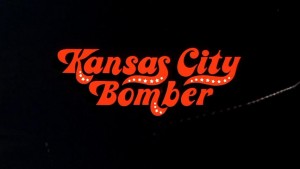 Here’s the idea behind “A Canadian, an American, a Lawyer, and an Elitist”: Rhett’s favorite movie is Meatballs 4, Shawn has an unhealthy fixation on Resident Evil, Richard scoffs at anything that isn’t pretentious and hoity toity, and Adam is a prick who hates everything. We all watch far too many movies, and spend our time analyzing them. So we each watch the same movie, write our analysis of them, and then go to a chat room to discuss it, unaware of what the others have written. A warning: if you haven’t seen the film we are discussing, it may not be best to read this article, because it is spoiler heavy.
Here’s the idea behind “A Canadian, an American, a Lawyer, and an Elitist”: Rhett’s favorite movie is Meatballs 4, Shawn has an unhealthy fixation on Resident Evil, Richard scoffs at anything that isn’t pretentious and hoity toity, and Adam is a prick who hates everything. We all watch far too many movies, and spend our time analyzing them. So we each watch the same movie, write our analysis of them, and then go to a chat room to discuss it, unaware of what the others have written. A warning: if you haven’t seen the film we are discussing, it may not be best to read this article, because it is spoiler heavy.
Analysis by a Canadian: Rhett Miller
I’ve figured out the key to Raquel Welch’s untouchably beautiful screen persona. She may be beautiful in real life, but her screen persona has made her even more so; a goddess of the silver screen. Her secret is simple: she positions herself among the ugliest co-stars imaginable, so by comparison she looks like a Madonna. Next to primitive cavemen in One Million Years B.C. or the hideous trailer trash roller derby audience in Kansas City Bomber, even Roseanne would look sterling. There are a lot of laughs in the shot selection, as Raquel’s heavenly body is juxtaposed with the toothless snarling of rabid hillbilly fans, just as there are a lot of laughs in the gratuitous parade of roller derby fight scenes in Kansas City Bomber. We assume the sport of roller skating involves skating around a track and reaching a finish, but apparently the professionals in the film seem oblivious to such a concept, as they bypass the trill of the race for good old fashioned violence, getting into catty slap fights instead of riding around the track. We see more people hit in the head with a broom than we do people crossing the finish line, and Kansas City Bomber has a great deal of fun wallowing in the spectacle of wrestling on wheels.
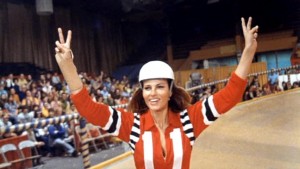 Like wrastlin’, characters are caricatured into stereotypical crowd favorites, like the bull dykes, sex pots and Samara from The Ring. There are so many stunt skaters standing in for Raquel or her opponents that in the derby scene nearly everyone looks like they are out of a wacko Japanese horror movie. There is great fun in laughing at the continuity errors in the film, be it the wigging out of actors or Raquel’s on-again, off-again wrist guard. Considering how much of the film plays out in stunt doubled wide shots, it is a wonder how Raquel was ever able to break her wrist on set, since her performance is reserved for close-up cut-ins. Amidst all the continuity fun, the greatest moment comes early in the film, when a masculine Raquel stand-in suddenly initiates a flying elbow to the downtrodden Big Bertha. At that point the movie promises high thrills, excess for excess’s sake, which is the badge of honor for a drive-in classic.
Like wrastlin’, characters are caricatured into stereotypical crowd favorites, like the bull dykes, sex pots and Samara from The Ring. There are so many stunt skaters standing in for Raquel or her opponents that in the derby scene nearly everyone looks like they are out of a wacko Japanese horror movie. There is great fun in laughing at the continuity errors in the film, be it the wigging out of actors or Raquel’s on-again, off-again wrist guard. Considering how much of the film plays out in stunt doubled wide shots, it is a wonder how Raquel was ever able to break her wrist on set, since her performance is reserved for close-up cut-ins. Amidst all the continuity fun, the greatest moment comes early in the film, when a masculine Raquel stand-in suddenly initiates a flying elbow to the downtrodden Big Bertha. At that point the movie promises high thrills, excess for excess’s sake, which is the badge of honor for a drive-in classic.
But then things get serious. Early traces of women’s lib first show up when Raquel must deal with being a single mom (to a young Jodie Foster, no less!) but then gratuitous roller skating makes us forget the heavy handed social commentary. But then the drama really starts to compound, when Raquel must deal with her alcoholic compatriot, the deportation of her roommate, the claim for legitimacy by her oafish friend, and the problems of selling out for fame and fortune. A tidal wave of solemnity seeps into the picture, and it never recovers. The fun is swept out from the film with every ham-fisted meditation on how owners are turning the game from sport into spectacle. Raquel pleads that her tubby friend refrain from playing to the audience with spectacle, and at the same time the movie similarly turns it’s back on the audience. It tries for legitimacy, but the conflicts and drama are so routine and empty that it becomes nothing but a bore. It is impossible to care for these actors as people when the film starts off so shamelessly as developing them as caricatures. I would care if my best friend were mocked for being overweight, but I would not offer the same sympathies to such a comment directed at Fat Albert.
Kansas City Bomber starts off with grand spectacle, with enough rollerskatesploitation to please even those raised on Roller Boogie, but then throws in its drive-in card and tries to play to opera houses. Raquel even teases by participating in a shower scene without any nudity, the slap in the face to any drive-in connoisseur. The movie returns to glorious spectacle at the end, when Raquel catfights her way to the finish line in slow motion and from four different angles (call the continuity police, each time looks different), but by that point it is too late. Kansas City isn’t a bomb by any means, but in ignoring the audience with its plea for Social Relevancy, it can’t help but leave a bitter taste.
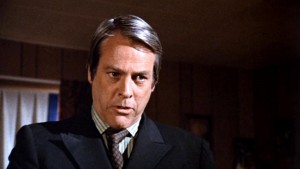 Analysis by an American: Shawn McLoughlin
Analysis by an American: Shawn McLoughlin
The only sport that I can think of that was semi-big and lasted for a shorter period of time than Roller Derby was the XFL. However, unlike the Roller Derby, which is lodged securely in nostalgic hearts and minds everywhere; few will ever remember McMahon’s most costly folly. Think about it for a moment. Where are our XFL movies? They don’t exist, and it’s highly doubtful that anyone will ever make one. Roller Derby was for a very short time, the biggest sport in America, surpassing Football. For the first time, there was a violent form of entertainment that the whole family could enjoy. The game consisted of only two main objectives; skating around in a circle, and beating the snot out of each other. The players never made any serious money, and most held day jobs, but that only made the prospect of being your hometown’s hero all the more likely. People of any physical ability could become superstars in the community. Seemingly, if you could stand on your skates, you could participate.
As a film, Kansas City Bomber does a fine job of capturing the sport. As a dramatic work though, the plot is almost non-existent. Why the screenwriter went out of his way to even devise a sub-plot is beyond me when the main plot is ridiculously pointless. At no time watching this, are you going to care one bit about anything except the insanity of what happens on the court. Will you care about K.C.’s mom? No. How about her two kids that she is not raising? Nope. When Burt Henry far too easily seduces K.C. it feels as if almost anything can happen in this film. Because the script doesn’t even try to progress it at a conceivable pace, you are forced to assume that either K.C. is a slut or she is just amazingly desperate. You won’t be moved by Horrible Hank’s attraction to K.C. either or any other off-court drama. There should be a special mention to Helena Kallianiotes who plays K.C.’s rival Jackie as if she were channeling an alcoholic Morticia Adams.
The in-game theatrics are the high point of this film, pushing it beyond a typical sports film and into B-movie hilarity. If the derby was really like this back in the 60s-70s I know I would have watched. Watching the players routinely break the rules of conduct enables one to truly be amused. Benches are thrown into the rink; a bucket is placed over a man’s head as another person punches him. Seemingly anything goes, and even the fans get to run on stage if they feel so inspired. This was pro-wrestling on wheels and it is shown here well enough and in a very entertaining way. Thankfully, the director (or editor) knew that it was plot-less, and spends as much of the film as possible in the rink.
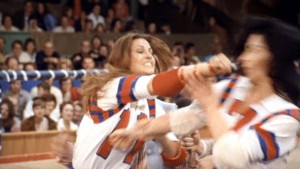 Is it high art? No, but Kansas City Bomber is possibly the most enjoyable film revolving around the sport, and it certainly has balls. Raquel Welch (as K.C. Carr), also has balls for performing her own stunts, and even breaking her wrist doing it. Come to think of it, for a game that uses no balls, it sure has a hell of a lot of it going around. If you want to see Kansas City Bomber with even less sex-appeal and more political commentary, go rent Rollerball (1975). It’s essentially the replication of Kansas City Bomber with a sci-fi bent to add relevance. They also added both balls to the title of the movie and the game itself, thus further increasing its greatness, but removing all the fun and heart. There is just something unconditionally wonderful about seeing one of the sexiest actresses of all time get pummeled into rails, that is sadly missing when seeing James Caan fight The Man. If Kansas City Bomber was more readily available (before the DVD release, it had never been released on any format) it would have been considered a huge cult film by now.
Is it high art? No, but Kansas City Bomber is possibly the most enjoyable film revolving around the sport, and it certainly has balls. Raquel Welch (as K.C. Carr), also has balls for performing her own stunts, and even breaking her wrist doing it. Come to think of it, for a game that uses no balls, it sure has a hell of a lot of it going around. If you want to see Kansas City Bomber with even less sex-appeal and more political commentary, go rent Rollerball (1975). It’s essentially the replication of Kansas City Bomber with a sci-fi bent to add relevance. They also added both balls to the title of the movie and the game itself, thus further increasing its greatness, but removing all the fun and heart. There is just something unconditionally wonderful about seeing one of the sexiest actresses of all time get pummeled into rails, that is sadly missing when seeing James Caan fight The Man. If Kansas City Bomber was more readily available (before the DVD release, it had never been released on any format) it would have been considered a huge cult film by now.
With the amazing let’s-see-it-from-all-angles-in-various-stages-of-slow-motion finale, it should be obvious to everyone. The real winner isn’t K.C. Carr; it’s the viewer!
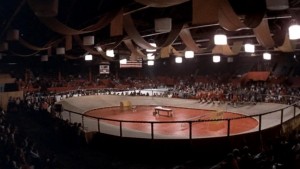 Analysis by a lawyer: Richard Stracke
Analysis by a lawyer: Richard Stracke
Kansas City Bomber attempts to portray the gritty locker room rivalries of the 70’s roller derby circuit, but it fails in nearly every regard. Sloppy editing and the verite look can create intimacy when a film presents fascinating characters or hitherto unexplored subcultures. KCB does shine a spotlight on a world that I was never privy to, but it does so in such a haphazard way that it was impossible for me to care. In fact, it was challenge to keep my eyes open.
Its most obvious flaw is the horrendous pacing. Unremarkable scenes (of which there are many) drag on endlessly while scenes of potential interest seem to end in mid thought. Directors like Robert Bresson use such techniques to challenge the viewer and the lend an air of ambiguity to their work. His films may be trying, but there is clear evidence that each of his cuts was intended to create a specific effect. This is not the case with Kansas City Bomber. I was constantly frustrated by the abrupt shifts and lack of context. Never having seen a real roller derby match I was unaware of the rules. I know it involves a series of laps and various no holds barred attempts to win the race, but as far as positions, strategy and each team’s goals, I was in the dark. These things may have been common knowledge at the time of release, but they cause it to date terribly.
The lack of context or explanation also eliminated any sense of drama from the multitude of game time scenes. They were incredibly repetitive. Apart from the on team rivalries I never got a sense of each team’s position in the league. I’m not a fan of the underdog team genre of sports films, but I found myself praying for just such a subplot. It would have alleviated the monotony,
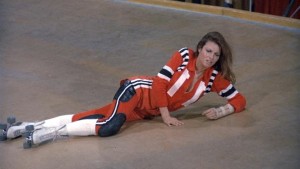 Did the film have any positives? Yes. The fashions found in the crowd and on Welch’s team were outstanding. While I was unable to follow the matches themselves, I was on the constant lookout for fascinating crowd reaction shots. Kansas City Bomber did not disappoint. Its crowds were so lacking in refinement and grooming skills that I fantasized about Walmart greeters denying them admission to their esteemed place of employ.
Did the film have any positives? Yes. The fashions found in the crowd and on Welch’s team were outstanding. While I was unable to follow the matches themselves, I was on the constant lookout for fascinating crowd reaction shots. Kansas City Bomber did not disappoint. Its crowds were so lacking in refinement and grooming skills that I fantasized about Walmart greeters denying them admission to their esteemed place of employ.
The film also made an effort to approach themes as complex as the lower class’ inability to accept beauty or anything more than mediocrity. Efforts were made to destroy Welch’s face. Not because she had done anything to deserve it; but merely because the obese, ill-mannered women who shared her locker room were too insecure to deal with anything other than beer-swilling social outcasts. This theme was not examined as thoroughly as the subject matter demanded. In fact, at times it appeared to be merely an aside. Still for me, it was the thematic heart of the film.
The film also suffered because it did not take full advantage of its star or the over the top nature of its milieu. The world of the roller derby (as illustrated by modern day the modern day skool gurl punks in the Arizona leagues) is meant to be outlandishly sleazy. With its PG rating the film only glimpsed the debauchery that surely went hand in hand with being a member of a squad. Also, while I’m not normally one to cry out for nudity in film, Welch is such an atrocious actress (barely able to finish a line. Mumbly. Etc.) that the only reason she could possibly have been cast in film was her sex appeal. Even if the producers were required to turn in a tame product, they could have upped the camp quotient and cast her as a seductress and not simply a boring absentee mother of two. That conceit would have been just fine had the film been the scathing exploration of the underbelly of roller derby that was promised, but in the end, it is little more than a sloppily constructed, non-entertaining failure.
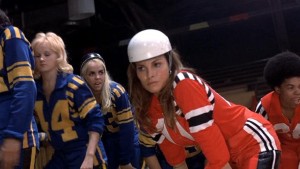 Analysis by an elitist: Adam Lippe
Analysis by an elitist: Adam Lippe
A perfect genre movie has to be either aware of the normal conventions to the point that it uses them and expands on them, or willfully engages in clichés to excess, to where it turns to camp. Roller derby is a great subject for a trashterpiece, because, much like wrestling, it is an odd combination of over the top fakery, athleticism, and silly overacting, without any need to embellish the characteristics of its heroes and villains, since they are naturally exaggerated.
Kansas City Bomber is very confused as to its intentions, which is precisely why it goes in so many off-kilter directions and gives up by the time we hit the “what exactly does this solve?” ending. If the idea is for the viewer to care about KC and her family issues, shouldn’t there be some attempt to show how she is willing to sacrifice a little bit for them? In a low rent roller derby league, she can’t be making much money, especially as it is established that the smallish arenas don’t even fill up. What good is she as a mother if she just dumps her kids with their grandmother and randomly visits them every few months? Of course they feel distanced from her. Is she a feminist, trying to live her life for herself, escaping the depressing world of her mother, who only knows how to speak in timeworn phrases (“you ought to have your head examined”)? Is she a pariah for the ills of the team she was traded to, only trying to help not one, but two players, a sad drunk and a buffoon, whose subplots go nowhere? Is she the object of lust for the team owner, an unwilling victim to his capitalistic and animalistic urges? His intentions seem perfectly obvious from the start and KC seems like a buffoon for not noticing all the signals. And what happens to those guys who try to kidnap/rape KC and Lovey? Besides, regardless of the outcome of the final race, isn’t KC still going to be sold to the larger league? If she isn’t, her teammates will hate her even more for getting rid of yet another player.
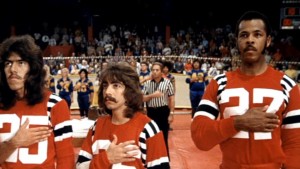 What’s oddest about the film is that it handles all these issues with sincerity, but only enough to maintain for five minutes of screen time before moving on to something else. The filmmakers assume that the audience has such a short attention span, that it never even bothers to explain the rules of its game, one has to figure it out through empirical evidence (though why a second person needs to wear a helmet just to block is quite confusing). Is it because the film wants to take the high road, which would explain the PG rating and the avoidance of the almost required elements of a B movie of the time, namely nudity (which, like a women-in-prison film, would have been easily worked in, especially a possible lesbian scene between K.C. and Lovey), extreme violence, and more colorful language? There is a slick avoidance of even addressing whether or not the game is real, skirting around which parts require athleticism, and which require “professionalism.” The fakery can be amusing, especially as the women are quite clearly pulling their punches and comically missing when they try to jump on their adversaries. But even in the final scene, where we see K.C. getting up and reaching for the finish line three times in slow motion, before it plays out in real time, with the girls falling all over the place, it appears that the effort and struggle is real. It is clear that a decision was not made as to how to present it, but this is part and parcel with the rest of the movie. Normally, a writer or a director would insist upon reducing the number of subplots to allow for more focus, but most likely, in an attempt to create something more realistic, they tried to take the cartoony nature of roller derby out and create more down to earth situations. Unfortunately, there were no choices made as to how to take that approach and so they simply left everything in. I’m sure a 3 hour cut would have filled in a lot more holes (and probably a significant amount of the creepy romance angle between Welch and McCarthy), but it would be quite difficult to sit through such a film.
What’s oddest about the film is that it handles all these issues with sincerity, but only enough to maintain for five minutes of screen time before moving on to something else. The filmmakers assume that the audience has such a short attention span, that it never even bothers to explain the rules of its game, one has to figure it out through empirical evidence (though why a second person needs to wear a helmet just to block is quite confusing). Is it because the film wants to take the high road, which would explain the PG rating and the avoidance of the almost required elements of a B movie of the time, namely nudity (which, like a women-in-prison film, would have been easily worked in, especially a possible lesbian scene between K.C. and Lovey), extreme violence, and more colorful language? There is a slick avoidance of even addressing whether or not the game is real, skirting around which parts require athleticism, and which require “professionalism.” The fakery can be amusing, especially as the women are quite clearly pulling their punches and comically missing when they try to jump on their adversaries. But even in the final scene, where we see K.C. getting up and reaching for the finish line three times in slow motion, before it plays out in real time, with the girls falling all over the place, it appears that the effort and struggle is real. It is clear that a decision was not made as to how to present it, but this is part and parcel with the rest of the movie. Normally, a writer or a director would insist upon reducing the number of subplots to allow for more focus, but most likely, in an attempt to create something more realistic, they tried to take the cartoony nature of roller derby out and create more down to earth situations. Unfortunately, there were no choices made as to how to take that approach and so they simply left everything in. I’m sure a 3 hour cut would have filled in a lot more holes (and probably a significant amount of the creepy romance angle between Welch and McCarthy), but it would be quite difficult to sit through such a film.
It is odd to attack a movie for not being trashy enough, but it doesn’t manage the classiness it is attempting either, and so it is stuck in the middle of nowhere. General apathy. It also might not be fair to criticize a film for what it isn’t, even when it is willing to engage in campy dialogue every now and then (“You know, in 6 months buddy, you’re gonna wish you traded me your right arm instead of K.C. Carr” “You bunch of female jockstrappers!” “Screw you sister!… I wouldn’t give you the pleasure”), but when a film doesn’t bother to deal with its own plot, discarding its ups and downs so frequently, you can tell it isn’t interested in its own dilemmas either.
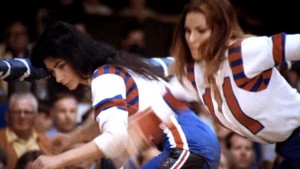 The Chat:
The Chat:
Rhett Shawn has broken his wrist and is unable to chat with us tonight.
Adam Why was Kansas City Bomber about roller derby, as about to say mud wrestling? There seemed to be no particular reason for the roller derby stuff. Wasn’t it all “rest” of the film? So much time devoted to 42 subplots, none resolved.
Shawn I think the roller derby stuff was the only significant part. There really was no, “rest” of the film.
Rhett Is that even how the roller skating sport is played? Like do skaters really give the flying elbow to each other?
Richard Speaking of the lack of roller derby necessity, does anyone know the rules of roller derby? I was never sure how points were scored. That meant that apart from the 1 on 1 challenges I couldn’t care less about the games.
Shawn The movie is exactly how roller derby is played, with no regards to the rule.
Rhett But the ending does rip off Zabriskie Point, which is awesome.
Adam Yes, that is how roller derby is played, according to how I remember it from the way it used to be on TV in the late 80s.
Shawn I was inspired to do much Roller Derby research as a result of this film.
Adam And what did you discover?
Shawn That there is still a quite avid following. Mainly from punkette girls.
Rhett I could never take the competitions seriously because i just assumed that dusting someone with a mop was off limits to all sport.
Adam There really should have been some establishing what parts were faked and what was real. Because the ending pretends that competition is “real” even though it is semi-fixed and they keep missing with the People’s Elbows.
Rhett Well, she does give it all she’s got, saying to hell with the fixed result.
Adam Yes, but when they kept falling on each other, that was all faked.
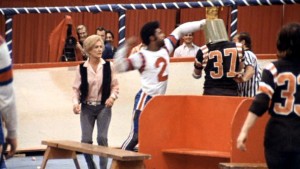 Shawn Props to the black guy throwing the bucket over the others head and punching him. A classic maneuver, played out to much comedic wonderment. I think the final “battle” was hot.
Shawn Props to the black guy throwing the bucket over the others head and punching him. A classic maneuver, played out to much comedic wonderment. I think the final “battle” was hot.
Adam That’s why I mentioned mud wrestling, there is no reason that it is really different than wrestling and mud wrestling would have automatically revealed more Raquel.
Shawn Like Faster Pussycat, Kill Kill without the killing.
Rhett My interest was recaptured in the final scene of KCB after having wavered for the dramatic plot line overload in the middle section. I will not forgive Raquel for partaking in a shower scene without nudity. Such a scene should be banned from cinema.
Adam The ending would have worked had the rest of the drama not taken itself so seriously.
Rhett Yes, the movie gets bogged down in seriousness in the middle.
Shawn I have to admit, they devote more time to the sport then most films do. Rollerball, which ripped off this movie, showed much less of the game.
Richard Was there a reason why it was so tame? I kept thinking the film could’ve been so much more enjoyable had it shunned all seriousness and either gone way over the top. I hate to hurt Shawn’s feelings but the only scenes I liked were… the opening and ending. The rest just seemed to meander into those unresolved and inconsequential ‘dramatic’ moments.
Rhett I liked it a bit more, but the opening and ending were the bits with the most energy. I totally agree though rich, the movie should have embraced the excess, because really, how are you supposed to take people who attack each other with brooms seriously at any point?
Adam Or tried to be different. Either be inventive or be trash.
Shawn Well I give it credit, because it is a film about roller derby for chrissakes and they tried to have a commentary of some sort.
Richard I can’t think of specific examples, but there were pointless scenes that ran way too long and others that showed interesting potential but were cut off- seemingly in mid scene. It was distracting.
Adam Too much lesbian potential forgone with the generous roommate.
Shawn It fails in several scenes. I think that the boathouse scene with the manager goes on far too long. Faaaaaaaaaaaaaaaaaaaaaaaaaaaaaaaar. And there is never any real explanation for how easily KC was seduced by the manager.
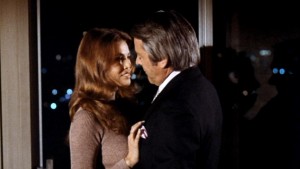 Adam No, especially with how obviously manipulative, and yet unappealing he is. He has that hair that looks like a rug, but probably isn’t.
Adam No, especially with how obviously manipulative, and yet unappealing he is. He has that hair that looks like a rug, but probably isn’t.
Shawn And his replacement in Rollerball played the role like a Bond villain, which is exactly how such a cheesy character should be played. (bald too!) But I completely agree that the best action was on the court. er… rink
Adam Shouldn’t there have been an attempt to try explain the rules though? Or at least give some perspective. There’s some sense that the guys play a few rounds and the women a few and the points are combined. But a crowd would probably be restless with all that repetition.
Richard I was thinking the same thing about the audience, Adam. The constant repetition couldn’t have been good and the lack of outright sleaze would lose some of them.
Rhett I loved how Raquel just agreed to move in with the roommate without having ever met her before, without having seen the house, or without even knowing what the price was.
Richard Was I the only one wanting more from the rivalry between Welch and the former star? It seemed that they were satisfied in blaming it all on jealousy, but it could have been much more satisfying if it were built up (even to campy extremes).
Rhett She is just like “okay!” and then the camera lingers on her wonderful breasts.
Adam Increased breast lingering would have helped too.
Shawn They probably didn’t feel the need to explain the rules. In Any Given Sunday, do they explain football?
Adam With Any Given Sunday, Oliver Stone doesn’t even understand the rules of football. He thinks every play is a touchdown or an interception.
Shawn Better example, Miracle doesn’t tell you what a Hat Trick is.
Rhett But you don’t need to explain football because it is a popular sport. The roller derby is not nearly as well known.
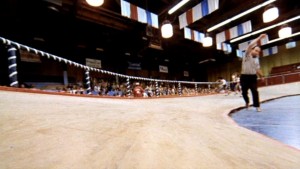 Shawn Roller Derby was HUGE at that time Rhett, at least in America. Everyone seeing this movie knew how it was played.
Shawn Roller Derby was HUGE at that time Rhett, at least in America. Everyone seeing this movie knew how it was played.
Adam Shawn, no more than arena football is now. A small niche, on TV when the “real” sports are out of season, otherwise banished to local broadcasts during a rain delay.
Shawn Adam, Roller Derby was broadcast on all three major networks in the 60’s.
Adam As is arena football.
Shawn Arena Football is only broadcast on one station here, additionally, in the 50s-60s there was no cable. You got the networks, and that was it.
Richard Roller Derby always seemed that it was something that you would watch if you were bored or lazy. It never seemed like the sort of thing you would make an effort to see or follow (a la NFL or whatnot). I just asked my mother about her recollections of roller derby. “I don’t even remember it. Made no impression on me.”
Shawn You underestimate the cultural impact of the sport. And we all know what big sports fans your family is, Richard.
Rhett I cannot comment, because in Canada the sport at the time was seal clubbing.
 Rhett Does anyone know how Raquel broke her wrist? Because it seems she is not in any of the derby scenes save for close-up. Instead she is replaced with a muscular stunt double with a Samara wig
Rhett Does anyone know how Raquel broke her wrist? Because it seems she is not in any of the derby scenes save for close-up. Instead she is replaced with a muscular stunt double with a Samara wig
Adam She broke it the same way the rest of us get carpal tunnel. And not because of the keyboard.
Richard Those wigs were a highlight for me. As were the crowd reaction shots.
Shawn The crowd was awesome.
Adam Especially that retarded old lady near the end, yelling at Hank.
Rhett That old lady was at the start too. I fell in love with her all over again at the end.
Shawn I would like to think that wasn’t overdone, but I’m sure that was exaggerated. I thought Horrible Hank’s “Don’t Laugh at MEEEEEEEEEEEE!” was comparable to James Dean’s “You’re tearing me APART!”
Richard I don’t think the crowd was too far removed from the truth.
Shawn What I couldn’t understand about the sport and I think this is just due to budget is the same two teams, in the same area keep playing each other and in the 70s, it was a national circuit.
Adam It was like a Globetrotters-Generals game. These were the minor leagues, I guess, if he was just getting a national deal. What didn’t make sense was, if they were always playing the same team, why did they need to travel on the broken down bus all the time?
Richard That added realism. We needed to see how they suffered on the road. After all, it wasn’t a glitzy life.
Rhett So the movie could keep up its quota of gratuitous landscapes introduced by Raquel’s epic cross country journey at the start.
Adam Yes, and that fantastic dissolve where she walks right towards the screen.
Shawn I love the “lets-see-it-from-twenty-angles” ending…
Rhett Shawn give it credit, if Zabriskie Point wasn’t so great then that ending wouldn’t have been lifted for KCB.
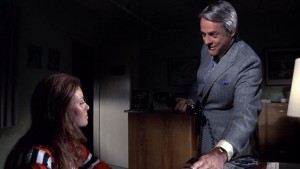 Shawn Has anyone besides me seen the original Rollerball? Well the game in Rollerball is more of a real “sport” objective game. I’m surprised no one ever tried to make it a real sport, but without the killing. Have you seen the original anytime recently to recall the structure? Because it really is the same movie, only with a male lead, and a dystopian society to give it the sci-fi edge. It came out two years after KCB and I would be surprised that it wasn’t an influence. Where I think KCB ultimately fails is that KC Carr is never made to be either a sympathetic parent, or a really likeable character you can root for. Whereas in Rollerball you feel the need to support James Caan (Jonathan E.) in fighting the system.
Shawn Has anyone besides me seen the original Rollerball? Well the game in Rollerball is more of a real “sport” objective game. I’m surprised no one ever tried to make it a real sport, but without the killing. Have you seen the original anytime recently to recall the structure? Because it really is the same movie, only with a male lead, and a dystopian society to give it the sci-fi edge. It came out two years after KCB and I would be surprised that it wasn’t an influence. Where I think KCB ultimately fails is that KC Carr is never made to be either a sympathetic parent, or a really likeable character you can root for. Whereas in Rollerball you feel the need to support James Caan (Jonathan E.) in fighting the system.
Adam Yes, KC is an awful, irresponsible parent. If she’s not making that much money in the roller derby, why is she deliberately staying away from her kids and making her mom take care of them?
Rhett Especially after seeing how her son has basically disowned her.
Shawn I think the character’s motivation was primarily to get to the big leagues.
Richard I was going to ask, was Welch such a huge star that her presence alone would make her ‘likable’?
Rhett At that point, probably.
Shawn Well, she was what encouraged me to rent it. Let’s face it, if she wasn’t in it, I wouldn’t have even thought twice about renting it.
Rhett And here I thought you cared about the sport.
Adam And from the story I read, with the writer approaching her in a hotel room, or dropping the script off for her under the door or something, you’d figured she would be inspired to do it not just a star power vehicle, which are usually made when the script is in shambles and just for the money. “Writer Barry Sandler got Raquel Welch interested in this project by showing up on her doorstep and leaving a script with her personal assistant. He was attending UCLA film school at the time.” Sandler wrote Crimes of Passion. Which is surely the greatest fashion designer by day/hooker by night starring Kathleen Turner and featuring Anthony Perkins as a mouth foaming villain, movie ever made.
Rhett I thought Hank had some heart tugging lines Anyone else get a tent during Big Bertha’s scenes?
Shawn Let’s be real, it couldn’t have been because the script was good. Maybe Raquel just loved the sport. I read that she trained for 8 months too.
Rhett Or maybe she liked the prospect of teasing us in the shower scene.
Richard Or dusting off a hog beast with a mop.
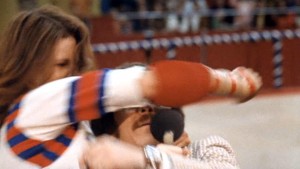 Shawn Or choking a commentator out of nowhere.
Shawn Or choking a commentator out of nowhere.
Rhett Yeah, Shawn, why does she do that?
Shawn I think it was done off the cuff, Rhett.
Adam Rhett, I figured it was one of those fake “wrestling” moments, the between the match stuff.
Shawn I doubt that was scripted, because Raquel looked like she was laughing the whole time. Remember too, at this time the theatrics of the WWF (at least not the Vince McMahon type) had not surfaced. It seems like this home gladiator type arena could have easily spawned that attitude.
Adam Obviously, if the commentator wasn’t in on it, he would have reacted differently, especially when that guy gets thrown into the booth, hitting him in the face. It reminded me of G.L.O.W. a lot, the Gorgeous Ladies of Wrestling.
Shawn Helena Kallianiotes played her character Jackie like an alcoholic Morticia Adams, and I loved her for it.
Adam So Shawn, what was the overriding reason you have such enthusiasm for the film?
Shawn Because it is a very isolated film. It was a complete product of it’s time about a not hugely documented culture. There will never be a KCB 2. And it has over-the-top humor, unintentional and intentional. Plus I live for B-movie shit like this.
Adam But there were lots of roller derby movies made, often much sleazier. What distinguishes this? Other than a big star was in it.
Shawn But none that made an attempt to capture the sport.
Adam Neither did KCB.
Rhett You are forgetting the mop scene, Adam.
Adam KCB was more concerned with a million and one subplots.
Shawn Sure it captured the sport. It assumes you have knowledge of the rules, it shows whole matches being played, and you see the fans, and the players, and the hardship of the sport.
Adam It all seemed like Wiseman-style footage. No real insight, just things happening, with no knowledge of the sport.
Rhett You did not just bring up Frederick Wiseman in a discussion on a movie about roller derbies…
Adam That’s what I meant by the fact that it could have been about anything.
Shawn Think about it like this: It’s 1973, you’re going to see this movie for the first time…. Why do you want to see it? Big star, sport you love, etc. You aren’t going to see it for an educational piece.
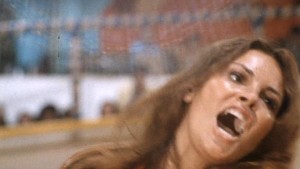 Richard But if you went into it to see Raquel or the sport you loved, wouldn’t you likely be disappointed? Not sleaze, little competitive sportsmanship.
Richard But if you went into it to see Raquel or the sport you loved, wouldn’t you likely be disappointed? Not sleaze, little competitive sportsmanship.
Adam I don’t want education on it but at least some knowledge of how the sport works, even if it isn’t given to us.
Shawn Why? If you already know it, why would you want to be shown what you already know?
Adam It doesn’t appear the filmmakers knew anything about it either Think of a great sports movie or a great movie about anything… Big Night doesn’t explain to you about cooking, but it has insight about a kitchen, how meals are prepared, how a restaurant is run and what food means to the characters.
Richard I also felt like a bit of background could have helped expand the film’s target demographic. Sure, it could appeal to rabid RD fans, but what about the people who barely watched it.
Adam Richard, I don’t think RD fans would enjoy it. Too much side business. Not enough coherence in the matches themselves. It was like a musical without much focus on the concerts.
Richard 3 minutes (or less) of explanation could have helped with that. I don’t think the fans would have been satisfied either, but at least they could fill the seats.
Shawn I agree that there is too much unneeded sub-plot. Particularly when it makes the main character unlikable. That is the keystone to any sports film.
Rhett It starts off as a derby movie, but then tries to be a serious drama about all things non-derby related, and that is where it missteps
Richard I’ve been trying to think of whom the stereotypical KCB fan would be and I can’t do it.
Adam That retarded woman in the crowd and whomever has turned into a Nascar fan.
Shawn Well, in all fairness, KCB is hardly a stereotypical film.
Richard But even films that are non-stereotypical can normally be paired with certain sorts of fans. Even if I loathe something, I can usually reason that I wasn’t part of the target market. with this, I couldn’t figure out who that was, with the exception of the old lady.
Adam But Shawn, KCB is a genre film and doesn’t bother with trying to satisfy those people who would like that genre.
Shawn True, but what is its closest equal in that genre?
Rhett I believe it goes unrivaled in the roller derby wrestling genre
Adam Shawn, what about movies like Roller Blade and The Roller Blade Seven?
Shawn Both of those films start off “In a futuristic society,” which make them extensions to Rollerball, hardly based in reality.
Adam What about the documentary, Derby?
Shawn I think that KCB is an interesting failure. But I enjoy it, on superficial reasons, although Derby is still a documentary, not a fictional film.
Adam What are the superficial reasons?
Shawn Numbered for ease. 1. I like kitsch.
Adam Which this isn’t.
Shawn 2. I like Raquel.
Adam Doesn’t show her off very well.
Shawn 3. I like roller games.
Adam Which this doesn’t go into much.
Shawn With the exception of the already discussed sub-plots that are boring and useless I enjoyed myself, and laughed my ass off during the film. There is plenty of unintentional humor. Horrible Hank was a joke. BBB was a joke. The theatrics were a joke. Throwing the bench on the rink was awesome. The backwards jersey.
Rhett The wigs, the disappearing wrist guard.
Adam I did laugh at the theatrics. I kept wishing that it could retain that level though, be a full on Corman-style film.
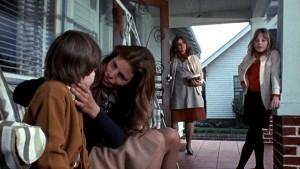 Shawn That is more than enough kitsch for me. But I agree with your point. Like I said, the hair pulling really made me think that with more tits this could have been made into a brilliant Russ Meyer film.
Shawn That is more than enough kitsch for me. But I agree with your point. Like I said, the hair pulling really made me think that with more tits this could have been made into a brilliant Russ Meyer film.
Richard I felt just like Adam. I enjoyed the camp during its all too brief moments. I would have loved the film had it kept the energy of the opening and ending
Rhett The slow motion ending was a brief moment of greatness, however.
Shawn Not only that, Rhett, but the locker room scene at the end. Where it was silent and kept cutting back to the screaming crowd. Very Antonioni.
Adam Obviously the intention.
Rhett Same target audience.
Adam What became of that rapist/kidnapping scene? Those guys attack them, they kick their ass, and nothing happens as a result?
Richard That rape scene was a red herring. Just like the murder in Au Hasard Balthazar.
Shawn I think it was meant to show that the women had the balls to overpower men, but that falters when KC is so easily seduced.
Rhett The rapist scene went nowhere; it just seemed to be there to show that Raquel was tough even though she got rocked by girls every time she was in the rink.
Shawn Yeah, but she gave it back too. Try fighting on skates sometime Rhett, I bet you’ll break your wrist too.
Rhett No, her male stunt double in Samara wiggery gave it back. I don’t think I would break my wrist looking exasperated and sweaty in close-ups.
Richard Maybe not in Kansas City Bomber, but in certain genres, that description is almost sure to involve some wrist action.



